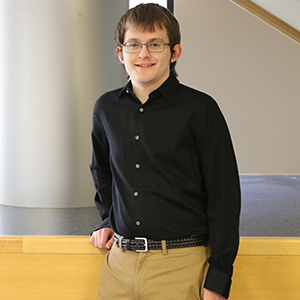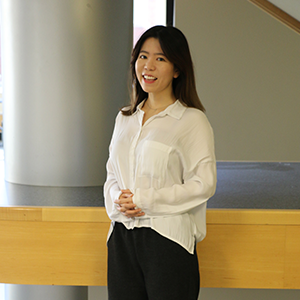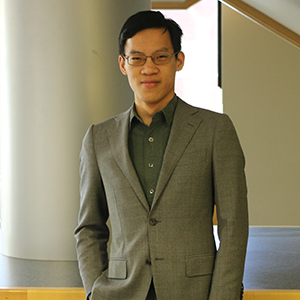Undergrads Recognized for CRA Outstanding Researcher Award
02-15-2019
Writer(s): Emily Kinsell

Undergraduates Cinkoske, Tung and Zhang Receive Honorable Mention for CRA Outstanding Researcher Award
Three Purdue students, Michael Cinkoske, Caleb Tung, and Ling Zhang received honorable mentions for the 2019 Outstanding Undergraduate Researcher Award by the Computing Research Association (CRA). The awards recognize undergraduate students in North American universities who show outstanding potential in an area of computing research. Cinkoske is a junior and Zhang is a senior in the Department of Computer Science; Tung is a senior in the School of Electrical and Computer Engineering.

Working with Computer Science Assistant Professor Jeremiah Blocki, Cinkoske’s research evaluates the mathematics behind memory-hard functions, specifically in the context of storing passwords. “This research interests me because I am able to work on a mathematical topic that has applications to computer security,” says Cinkoske. This research has real-world impact, by changing the way passwords are stored by memory-hard functions, it may be possible to mitigate the damage caused by hackers stealing password lists in data breaches. Per Cinkoske, “A memory-hard function’s cost to evaluate is dominated by how much memory it uses. For example, when creating a new password, it is transformed when run through a memory-hard function and the output is stored rather than the actual password. If an attacker were to steal the list of passwords and try with brute force to run each possible password through a memory-hard function, then the attacker would incur a huge cost by using a lot of memory.” Cinkoske’s and Blocki’s paper is in preparation.

Ling Zhang was nominated by Professor Susanne Hambrusch, Interim Department Head of Computer Science. Zhang works with Professor Yung-Hsiang Lu in the “Continuous Analysis of Many Cameras” (CAM2) research group. Zhang’s area of research focuses on building systems of data from publicly-available network cameras and serving the information in a user-friendly manner. The data found in these cameras is useful in areas of research like image identification, emergency prevention, and human behavior analysis, though due to a lack of central storage or recall system, this information can be, “lost” to research. In the era of Big Data and current machine learning methods, a large amount of data is needed to train a single model. By organizing the network cameras’ images and videos to a system, many areas of research could positively benefit from the data. Describing the importance of her work, Zhang emphasizes, “In the example of human behavior and hurricane research, instead of researchers physically going into an area before a hurricane strikes, we can provide the data from network cameras that are located on the path of the previous hurricanes, eliminating risk for the researchers.” Network cameras can observe more natural human behaviors in everyday life. Zhang explains, “Imagine how one would pose when having their picture taken versus their behavior observed on a traffic camera.” There is benefit to using this available data to improve specifically, hurricane preparedness or more generally, other problems society faces.

Caleb Tung was nominated by Professr Pedro Irazoqui, Interim Department Head of the School of Electrical and Computer Engineering. He also works under Professor Yung-Hsiang Lu in the “Continuous Analysis of Many Cameras” (CAM2) research group. The group works to train a computer programs’ ability to understand and detect objects by incorporating information about the camera that took the photo. Specifically, Tung’s research group on network camera object detection has huge implications for emergency response and safety. According to Tung, “If traffic cameras are able to detect car accidents and automatically call for help, we can get ambulances to the people who need them quickly, regardless of whether or not other people are there to witness the accident and call 911.” Tung’s paper, “Large-Scale Image Detection on Network Cameras in Variable Ambient Lighting,” is accepted in IEEE International Conference on Multimedia Information Processing and Retrieval for March 2019.
Writer: Emily Kinsell, 765-494-0669, emily@purdue.edu, @emilykinsell
Sources: Michael Cinkoske, mcinkosk@purdue.ede, Caleb Tung, tung3@purdue.edu, and Ling Zhang, zhan2275@purdue.edu